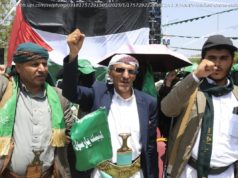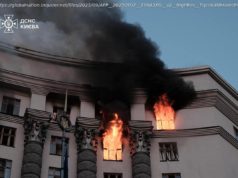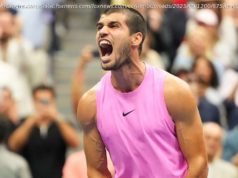While Putin has seven challengers on the ballot, none is a real threat.
MOSCOW — Russian voters are gearing up for a presidential election Sunday that Vladimir Putin is guaranteed to win. They are facing unusually intense pressure to vote, to grant him a convincing new mandate to pursue his nationalist strategy.
Candidates were barred from campaigning Saturday, but the message to voters was clear from billboards celebrating Russian greatness – a big theme of Putin’s leadership – and Kremlin-friendly media coverage.
Putin urged Russians on Friday to “use their right to choose the future for the great Russia that we all love.” He warned that failure to cast a ballot would mean that “this decisive choice will be made without your opinion taken into account.”
While Putin has seven challengers on the ballot, none is a real threat. The last time he faced voters in 2012, he faced a serious opposition movement, but since then he has boosted his popularity thanks to Russian actions in Ukraine and Syria.
More than 1,500 international observers are joining thousands of Russians to watch the vote. The government wants to ensure elections are clean after ballot stuffing and fraud marred the last presidential election.
This time the outcome is so certain that authorities are investing in get-out-the-vote efforts to ensure a decent turnout across the world’s biggest country. A strong showing would further embolden Putin domestically and internationally.
A Russian election monitoring group said Saturday it registered an “alarming” rise in recent days in complaints that employers are forcing or pressuring workers to vote.
Grigory Melkonyants, co-chair of the independent Golos center, said Saturday the group also recorded smaller complaints, such as gimmicks like discounted potatoes for people who vote, or schools holding special performances on election day to lure parents to an onsite voting station.
He said his own group has come under increasing pressure as the elections approach, and warned that independent observers may be targeted by some kind of “attack” on voting day. He didn’t elaborate.
As U. S. authorities investigate alleged Russian interference in President Trump’s election, Moscow has warned of possible meddling in the Russian vote.
Turnout-boosting efforts have been the most visible feature of the campaign – and all come from taxpayers’ pockets. In Moscow alone, authorities are spending $870,000 on balloons and festive decorations at polling stations.
In Moscow, first-time voters will be given free tickets for pop concerts featuring some of Russia’s most popular artists who have campaigned for Putin. For older voters, Moscow health authorities will be offering free cancer screenings at selected polling stations.
In the southern city of Tambov, the state-sponsored Youth Parliament has called an Instagram competition. Voters who take selfies at polling stations and post them under the designated hashtag will be able to enter a raffle for high-end electronics including an iPhoneX.
Election observers and local media report threats and coercion of voters to re-register at their place of work and report later that they have voted.
Yevgeny Roizman, mayor of Russia’s fourth-largest city Yekaterinburg and a rare government critic, said in a recent video blog that local officials and state employees have all received orders “from higher up” to make sure the turnout is over 60 percent.
“They are using everything: schools, kindergartens, hospitals – the battle for the turnout is unprecedented,” Roizman said.
Ella Pamfilova, chairwoman of the Central Election Commission who was appointed to clean up the electoral system, vowed to respond to complaints about coercion to vote.
“Leave people alone,” Pamfilova said at a recent session of the commission. “No manager has the right to tell them where to vote.”
Putin has traveled across Russia, pledging to raise wages, pour more funds into crumbling health care and education and modernize dilapidated infrastructure.
The presidential vote is set on the anniversary of Russia’s 2014 annexation of Crimea from Ukraine. Polls show that most Russians continue to see the takeover of Crimea as a major achievement despite subsequent Western sanctions.
Among Putin’s challengers is Ksenia Sobchak, a 36-year-old TV host who has campaigned on a liberal platform and criticized Putin’s policies. Some see Sobchak, the daughter of Putin’s one-time patron, as a Kremlin project intended to add a democratic veneer to the vote and help split the ranks of Kremlin critics.
Putin’s main foe, opposition leader Alexei Navalny, was barred from the race because of a criminal conviction widely seen as politically motivated. Navalny has called for boycotting the vote.
Send questions/comments to the editors.






